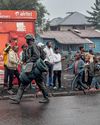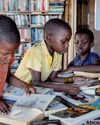
'IT WASN'T EVEN PISSED," Hanif Kureishi says, as if somehow that would have made it better. The writer is talking about the accident that left him a tetraplegic. Or, as he likes to call himself with classic Kureishian brutality, a vegetable. Though he's not. His body may be broken, but his brain isn't.
It was 26 December 2022 and he was in Italy. Back then the writer spent half his idyllic life in Rome, half in London. His three sons were adult and independent, he had enough money to enjoy a good life, he was in love with his wife, Isabella d'Amico, and, at the age of 68, the enfant terrible of English literature was content in a way he'd never been. He was having a beer, watching the football on his iPad, when he had a dizzy spell. He stood up, took a few steps forwards and fainted. He later discovered he had fallen on his head and broken his neck. Kureishi was left paralysed.
Would it have made any difference if he had been pissed? "I could have reproached myself more. You seek some kind of explanation; some kind of finality. Why has it happened to me?" At the London Spinal Cord Injury Centre, where he was transferred after spending a year in Italian and English hospitals, he was surrounded by people asking themselves the same question. Virtually all had suffered horrific fluke injuries resulting in broken necks. "Some twat had fallen out of bed and broken his neck. Some other twat had fallen down the stairs and broken his neck." Twat, in Kureishi's lexicon, is not an insult - just a synonym for person. "A nice guy tripped over a rake in his garden and broke his neck. So everybody in there is thinking, what the fuck? One guy, a close friend of mine, a political philosopher and rock climber, fell on his head and was paralysed from the neck down." Kureishi's neck break is partial. He still has feeling and movement in his limbs, though he cannot walk or grip with his hands.
This story is from the October 18, 2024 edition of The Guardian Weekly.
Start your 7-day Magzter GOLD free trial to access thousands of curated premium stories, and 9,000+ magazines and newspapers.
Already a subscriber ? Sign In
This story is from the October 18, 2024 edition of The Guardian Weekly.
Start your 7-day Magzter GOLD free trial to access thousands of curated premium stories, and 9,000+ magazines and newspapers.
Already a subscriber? Sign In

What is DEI and why is Trump waging war against it?
When American voters headed to the ballot box in November, opinion polls suggested the cost of living, immigration and reproductive rights ranked among their biggest concerns.

Who are M23 rebels and why is there fighting in eastern DRC?
The armed group M23 and Rwandan soldiers entered the centre of Goma last Sunday after weeks of advancing on the main city in the Democratic Republic of the Congo's North Kivu province.

Aid distribution What Israel's ban on Unrwa may mean for Palestinians
Israel this week insisted it would not back down over its plan to close the Gaza operations of the United Nations Relief and Works Agency for Palestine Refugees (Unrwa), even though critics said the move would jeopardise urgent humanitarian aid efforts.

Anti-terror strategy failed to stop a killer
Southport attacker's lack of coherent ideology meant the Prevent scheme did not see him as a potential risk, exposing the need for reform
Last writes
Handwriting is disappearing - we are far more likely to use our hands to type or swipe than pick up a pen. But in the process are we in danger of losing cognitive skills, sensory experience and a connection to history?

I just want to hug those girls' Bittersweet joy and relief as freed soldiers return home
Nineteen-year-old Naama Levy became an indelible symbol of Hamas’s 7 October 2023 attack on Israel.

Eighty years after the liberation of Auschwitz, survivors call for courage amid the rise of hatred and antisemitism 'We must avoid the mistakes of the 1930s'
On a day of startling blue skies, Auschwitz survivors stood before princes and presidents on Monday to remind the world, perhaps for the final time, of the horrors they suffered there during one of the darkest moments of human history.

Davos lessons Trump's return heralds new era of harsh global competition
In the heady mountain air of Davos last week, away from the parties and the backslapping tech bros, another, more beleaguered crew touted their wares: the multilateralists.

Can the continent's publishing industry turn a page?
Tsitsi Dangarembga's Nervous Conditions, a novel about growing up in colonial Zimbabwe, is one of the most important works of 20th-century African literature and features on university curriculums across the UK.

Trump has arrived with abang-but can he follow through?
Little more than a week ago, Stewart Rhodes was serving an 18-year prison sentence for seditious conspiracy over his role in a deadly attack on the US Capitol.